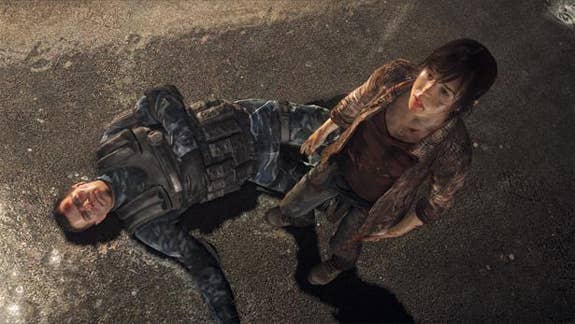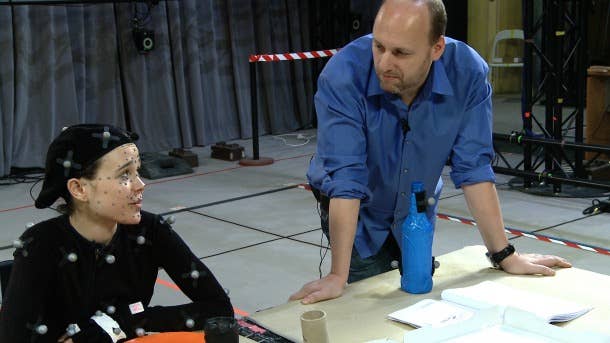Cage: I was trying "to be a little bit bold" with my DICE talk
We talk at length with the outspoken developer about his problems with the state of the games industry
Love him or hate him, Quantic Dream head David Cage is certainly great at sparking some heated conversation. And perhaps that's really the goal of his often provocative talks. Following a speech at DICE last week where he pleaded with the industry to "grow up" and he blasted lazy video game critics, GamesIndustry International sat down with the developer to gain a better understanding of his nine things the industry needs to change.
Importantly, Cage stressed with us that he's not telling his peers exactly what they have to do or that games must be made in one particular way. He admitted to us that he was, in fact, just trying to "be a little bit bold" in order to get his point across.
Ultimately, Cage just wants to see the video games medium evolve from where it is today. And in order for that to happen, there may have to be a revolution similar to Hollywood in the '70s, he said. Read on for much more insight into Cage's thinking and feel free to sound off in the comments section.
First of all, I'm not blaming anyone. I just express my frustrations sometime. If people do this, there is a very good reason. At the same time, there is the chicken and the egg thing. Do we make these games because it's what people want or do people buy these games because that's the only offer we have for them? That's a very interesting question. I always have in mind this very famous quote from Henry Ford that if I had asked my customers what they wanted, they would have said a faster horse, and it's the same thing here. Should we go to our customers and say, “What kinds of games do you want us to make?” There's a very good chance that the answer we're going to get is, “Oh, I want the same game we got last year, but better,” and this is exactly what we're doing.
"What about an election where there would only be one candidate? Of course you vote for the candidate. You have no choice. Let's bring choice to the table and let's see what people vote for"
David Cage
If you're creative in the game space or in any space, being creative means giving people what they want without knowing what they wanted. Our job is to imagine the product that you're going to like next year, not to make another iteration of something that you liked last year. So I think it's a common responsibility because it's definitely a comfort zone for everyone; we know that these games have a market and that people want them and so we make them again and again and again. Fair enough, there is a market for that and there are people who want it. All I'm saying is, “Can we have a little shift where we also invest in new ideas and innovation and where we try to explore different routes and not just the ones we know?” - because there will be a point where people will be fed up with playing the same games. And we see all the big franchises in the past that were so huge at some point ended up collapsing. And, OK, new franchises appeared and there's this cycle and I think it's time for new ideas now.
Yeah, but they should have the choice. What about an election where there would only be one candidate? Of course you vote for the candidate. You have no choice. Let's bring choice to the table and let's see what people vote for. Again, I'm not saying that these games will disappear. They will never disappear again. There's a market for it, so we'll keep making them. But let's make sure that we have more diversity, that we have a choice of content for our consumers so they can really pick up what they like and can decide what they want versus just giving them one thing and saying, this is what you want.

When you talk to developers, most of the time, what you realize is that they are not the problem. They have ideas. They have projects that they're ready to pitch. The thing is that when they go to publishers, publishers are sometimes too shy and not willing to invest.
Yeah, and publishers definitely have a responsibility, but again, it's not an easy market. What is interesting is to make a parallel to the world of cinema and to realize that in the '70s - there was a big revolution in Hollywood when Steven Spielberg and I think George Lucas, at the time, found independently their next movie after the success of Jaws. Suddenly they said to the studio, “You know what? We want to make our stuff on our side. We don't need your funding. We want to keep creative control over what we're doing so we are going to create a small infrastructure and we are going to deal with everything and we are going to let you distribute the film in the end.”
That was a big revolution and this is probably, to a certain extent, what needs to happen [in games]. And when you look at Hollywood today, big studios have not disappeared. They are still making very successful films. But at the same time, around them, there are a lot of very small structures of creative people who are working on independent projects and this is where the diversity of cinema comes from. And we see a little bit of the same thing happening right now with the indie space and that's very interesting.
The thing is that I don't have in mind a very defined project like I know exactly what we should be doing. No, this project should arise from this collaboration. We need to invent together something. I found the announcement this morning very exciting. I think Valve is very respected in the game space and JJ Abrams also is in his field. What I liked from what I heard is that this is not a business deal, not a marketing deal, but it is a deal that seems to be based on passion and common interest and these are the best deals. This is what I'm looking for, and for the industry as well, I think it's time for more constructive dialog between our industries based on mutual respect rather than trying to see how we can make money with the other party.

We can make money together but most of all we can make something meaningful together. Let's invent the business of interactive entertainment. You have expertise in the cinema field in reaching this wide audience and creating emotions and dealing with actors and all this stuff and we have experience in interactivity and interface and how to make this interactive land playable, how to add this third dimension to a script and to an experience. Let's work together and see what comes out of it.
I think it's society in general because those [ratings] boards are just the mirror of what society thinks about games. What I tried to explain this morning was it's a split of responsibility. I'm not trying to say, “Oh, we're just victims of the bad society who think just bad things about us.” We also share responsibility in the sense that we've done a lot of stupid things in the past. Think about Hot Coffee - and I don't want to list other ones - but there are so many stupid things that we did. Why? Why did we do this? We just lost credibility. We just lost trust. And we sent a loud and clear message that we are a bunch of teenagers totally irresponsible and immature doing stupid things. And now it's a struggle to get this credibility back, to say, “hey, you know what, there were stupid things we've done in the past, but this is not the industry.”
We can do very interesting things with this medium. We can be emotional. We can be responsible. We can be clever. We can create very meaningful experiences. So it's really a constant battle. And the boards tend to evolve in a positive way in that they take more and more the context into account. Like if you show tits - if there is a reason, if it is done with taste, if it tells something about the story, the characters, then fine, that's nothing drastic, versus if it's just for the sake of showing sex, then we have a different reaction. So they take more and more context into account, which is a great thing. At the same time, I'm still frustrated because I have the feeling that we don't have the same constraints regarding censorship in film and TV, and I don't understand why - there is absolutely no reason most of the time and I would like to see this change.
"The least you can do is respect the work that's been done, not by David Cage but by 800 people behind it... So please, make it a serious job in assessing and explaining why you think it's good or bad rather than just throwing figures on the face of people"
David Cage
Absolutely. You're right.
Of course not. The thing is that when you have this kind of speech, you need to be a little bit bold and you need to make bold statements and say games are like this, but it's not true. It's not all games. There are games that do this differently. There are games that don't need what I'm talking about. And I'm certainly not saying that I want all the industry to do what I'm saying here. I'm just saying, you know what, let's have different types of games for different types of audiences.
There's one part in particular that I would like to see and that is games for adults based on different paradigms I would like that section of our industry to appear. And when you talk about games for adults, some people might say, “But there are games for adults. You've got Wii Sports or Wii Fit or Angry Birds or what about this? Adults play that.” Yeah, right, that's true, but can we create games for adults that are not casual entertainment, that are really meaningful and a bit more sophisticated? That's really my question.
[PR rep interrupts: We're not really talking about violence in games. We're letting the ESA speak for the industry. ]
If I may just say something, I think it's important that the industry speaks with one voice in this particular situation.
Mobile phones and tablets are a really different world. They are accessible because of the interface. I was talking about console games and thinking that we could definitely do a better job at simplifying console controls. And this is never a very popular topic because then you will have people on their phone saying, “Hey, I don't want dumb games. I want games where there is a technique and I can try nice kills and blah blah blah.” And I'm saying, great, fine, we'll never stop making these kinds of games where you can fight against the system and show that you can beat your friend or your neighbor and that's fine. But I think that there are different kinds of interactivity that are not based on skills or techniques or system that we should start to think about and see how we can make things different.
First of all, I was really surprised by the feedback of the journalists I met with - on this topic that I thought was really unpopular. Actually, everyone came to me saying that was very interesting and I kind of agree and we should improve. Someone told me it's great to hear that we're a part of the industry and we do play a role, that we're not just observers. We're not just watching what's going on, we're on the inside. Definitely. Press is inside and has a role to play and you can influence friends in a positive or negative way.
I'm not against scores. I'm not against metacritics. And again, it's not a frustration. I thought Heavy Rain was overall very well reviewed. But yeah it's definitely extremely frustrating to read some reviews from people who think it didn't develop exactly the way they thought it should, and they just made bold statements - “I like this, I didn't like that, this is crap, and you get five [out of ten].” Wait a minute. This is my life. This is my job. The least you can do is take a minute and make me understand what you like or didn't like about my job and that's fine. The least you can do is respect the work that's been done, not by David Cage but by 800 people behind it. There's a team. There are people working night and day to deliver something. So please, make it a serious job in assessing and explaining why you think it's good or bad rather than just throwing figures on the face of people.
And again, I'm not trying to make it a bold statement like press is a problem. That's not what I'm saying. I tried to be very clear on stage that there are people doing a fantastic job and thinking. There are people thinking about the future of this industry and analyzing as they go they're trying to explain what they like and develop into real critics. I'm just saying that there's also a part of this press who's not doing the job very seriously, and they just come straight out and say they like games and they play games and they have an opinion and suddenly they became critics but that's not true. Being critics is a very serious job. It's a very challenging and difficult job requiring skills and talent, and I think there should be more respect in general.
Honestly, I don't know. I actually have probably my next three games in mind. Although I'm full speed on Beyond, I know what I'm doing after it because it's already in development, and I know what I'm doing after that and it probably after that. It's great because I have more ideas than I can develop. These ideas come naturally. I don't even need to think about it. It's just that this is how I work. I keep thinking all the time, all the time I'm working. And it gives time to ideas really to evolve and to come to a moment where they're ready to be written. So it's not like I just finished Beyond - oh my God, what am I going to do with the next idea? No, it's something that's matured for a very long time. That definitely helps a lot.
It's very important because when you start working on a project, you need to find that this is a good idea, not just for a week or a month but for years. You need to be sure that by the time you release the title it won't be like 200 other titles doing exactly the same thing in the same way. You need to make sure that you anticipated the evolution of technology in the right way because if you went too far you can't make the game, but if you went too low it will face competition. So all these are very challenging decisions to make.









